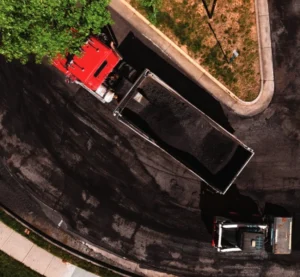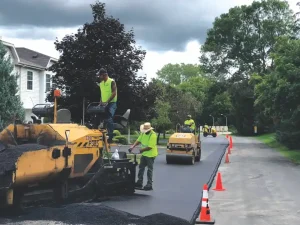Asphalt, the ubiquitous material blanketing our roads and highways, often gets a bad rap for its petroleum origins. However, beneath its dark exterior lies a surprising eco-friendly champion. Let’s explore three key facts that shatter misconceptions and reveal asphalt’s hidden green credentials: its exceptional durability, its unparalleled recyclability, and the significant environmental benefits it offers.
1. Asphalt Lasts Longer, Reducing the Need for Raw Materials
Unlike many building materials that follow a short-lived, replace-and-recycle cycle, asphalt boasts exceptional durability. Its resistance to cracking, warping, and weathering translates to longer lifespans for roads and pavements. This longevity minimizes the need for frequent replacements, which in turn reduces construction waste and the environmental impact associated with the production of new materials. Asphalt’s inherent strength also translates to lower maintenance requirements, further reducing the overall environmental footprint.
2. Asphalt is One of the Most Recycled Materials on Earth
One of asphalt’s greatest strengths lies in its remarkable recyclability. Reclaimed Asphalt Pavement (RAP), consisting of milled-up old roads, is the most recycled material in the United States, with a staggering 80% being reused in new asphalt mixtures. This not only reduces the need for virgin materials but also offers a sustainable solution for managing construction waste.
The asphalt industry continuously innovates to further enhance recycling capabilities. Warm Mix Asphalt (WMA) is a revolutionary development that utilizes lower production temperatures compared to traditional methods. This reduction in heat translates to a significant decrease in energy consumption and greenhouse gas emissions during the manufacturing process.
Asphalt shingle recycling is another emerging frontier in sustainability. Used roofing shingles, once destined for landfills, can now be incorporated into new asphalt pavements, creating a valuable secondary use for this waste stream.
3. Asphalt Recycling Has Many Environmental Benefits
The environmental benefits of asphalt recycling are substantial. By reducing reliance on virgin materials, recycling lowers the overall energy consumption required for asphalt production. This translates to a significant decrease in carbon footprint, mitigating the impact on climate change.
Recycling also promotes the conservation of natural resources. Asphalt is primarily composed of aggregates, which are mined from quarries. Reclaimed asphalt pavement offers a valuable secondary source of these aggregates, reducing the need for further quarrying and preserving these finite resources.
The economic advantages of asphalt recycling are equally significant. Reusing RAP is considerably cheaper than producing new asphalt from virgin materials. This translates to cost savings for road construction projects, benefiting both contractors and taxpayers. In conclusion, asphalt emerges as an unexpected champion of sustainability. Its exceptional durability, unparalleled recyclability, and the environmental and economic benefits it offers make it a compelling choice for eco-conscious construction projects. As innovation in asphalt recycling continues, we can expect this readily available and highly functional material to play an even greater role in building a sustainable future.
Get Professional Asphalt Services from the Experts at Pro-Pave!
At Pro-Pave Incorporated, we have a team of experts adequately equipped to handle your paving project. No matter what your vision may be, or what kind of materials you want to use, we have the skills and expertise needed to do the job right.
For more information about our approach to repairing potholes, call us directly at 703-433-9500 or fill out our contact form today!



